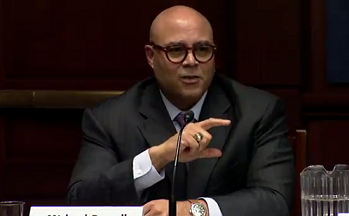Powell: Infrastructure Plan Should Target Unserved

The smarter way to stay on top of broadcasting and cable industry. Sign up below
You are now subscribed
Your newsletter sign-up was successful
Michael Powell, president of NCTA: The Internet & Television Association, told a Capitol Hill audience Wednesday that a new round of broadband infrastructure investment should focus on getting service to unserved areas and on tax incentives to private industry. To the degree that it will be subsidies, he said, they should be targeted.
Powell was speaking at a Capitol Hill panel Feb. 1, outlining infrastructure priorities. It was hosted by the Senate Broadband Caucus, which is co-chaired by Sens. Shelley Moore Capito (R-W.Va.), Angus King (I-Maine), Amy Klobuchar (D-Minn.), Heidi Heitkamp (D-N.D.) and John Boozman (R-Ark.).
The event featured both Senate and House Broadband Caucus members (it is bicameral as well as bipartisan). Moderating the panel was Information Technology and Innovation Foundation president Robert Atkinson. In addition to Powell, panelists were Meredith Attwell Baker, president of CTIA, and Jonathan Spalter, president of USTelecom.
President Donald Trump has pledged to invest a trillion dollars in infrastructure and the broadband caucuses on both sides this week called on him to prioritize broadband infrastructure buildouts.
FCC chairman Ajit Pai has already promised to make closing the digital divide a priority of his chairmanship, Tuesday announcing the creation of an advisory committee to help with that effort by coming up with model codes to speed permitting and rights of way and clearing away regulatory "red tape."
The president has not fleshed out his infrastructure reboot, but the panelists and legislators in attendance wanted to give him some direction.
Powell said that the reason that universal access was still a work in progress was "networks hate low density," which is why so much infrastructure, particularly in rural areas, struggles to find its economic footing. He said in economic terms, those are "market failures."
The smarter way to stay on top of broadcasting and cable industry. Sign up below
He suggested the mistakes made by previous broadband subsidy programs, like overbuilding existing service—serving up seconds before others have firsts—should not be repeated as everyone "gets on the bandwagon" for the next tranche of infrastructure investment.
Powell said that the goal should be to incent private investment rather than try to supplant it with government dollars that will not match the tens and hundreds of billions the private sector already invests.
Invoking Lincoln and sounding very much like amateur historian Tom Wheeler, formerly of the FCC, Sen. King said broadband access is like navigable streams and roads or like electricity in the 30s: an essential element for economic vitality. "People aren't going to live somewhere if they are told they aren't going to get broadband," he said.
Rep. Peter Welch (D-Vt.) pointed out that the country was divided, but that connecting rural and urban America via broadband could help bridge that political as well as digital divide. "The values of rural America are essential," he said. Urban America has to recognize those contributions, he said, and broadband connectivity is not a "favor" to rural America.
Caucus member Sen. Deb Fischer (R-Neb.) said broadband is a core responsibility of a "limited" federal government, adding: "We've got a lot to do."
Rep. Bob Latta (R-Ohio) said everything from education to farming to banking is all about connections, particularly given the Internet of Things. He said broadband connectivity was not a partisan issue. "It affects all of us."
Sen. Klobuchar said she was excited about a big infrastructure bill and making sure it includes broadband. She said she had met with Department of Commerce secretary Wilbur Ross, and he had assured her broadband should be included in any infrastructure package. She cited farmers using a McDonald's parking lot for broadband as an example of the need that needs filling.
Baker talked about the power of wireless to change lives. She said 99.7% of Americans have access to LTE networks, compared to 99.5% who have indoor plumbing. But she also said there is more to be done.
She also talked about the "transformative" power of 5G wireless, including changing how we drive, get healthcare and energy. She said 5G is going to need "a lot more spectrum" and help in citing towers for smaller cells.
Spalter said that when Trump talked about a trillion dollar investment, in concert with Congress, and Democrats offered their own plan, it got him to thinking about principles for an organizing framework and came up with three: 1. broadband first; 2) parity; and 3) clarity.
He said ones and zeros are the new asphalt and airstrips, so that it is important to make sure that broadband is included in any infrastructure conversation. Parity meant a level playing field, he said, and clarity means a "line of site" in the long term. "It is time to take the communications framework into the 21st century, he said, and rethinking the Communications Act.
Spalter said the need for broadband speed was not just about the speed of the service, but about speeding the new infrastructure plan. He said using existing mechanisms like the USF subsidy and Rural Utility Service could help speed the process. He also took slight issue with Powell's focus on unserved rather than underserved, saying it should not be a binary choice.
Contributing editor John Eggerton has been an editor and/or writer on media regulation, legislation and policy for over four decades, including covering the FCC, FTC, Congress, the major media trade associations, and the federal courts. In addition to Multichannel News and Broadcasting + Cable, his work has appeared in Radio World, TV Technology, TV Fax, This Week in Consumer Electronics, Variety and the Encyclopedia Britannica.

